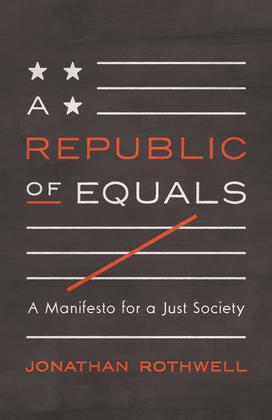Jonathan Rothwell *09 Revitalizes Conversation on Solutions for Income Inequality
The book: Income inequality: we’ve known it exists and we have theories to explain it, but we haven’t taken successful measures to reduce it. In A Republic of Equals: A Manifesto for a Just Society (Princeton University Press), economist Jonathan Rothwell *09 busts popular theories about the causes of inequality and offers fresh ideas to revitalize the conversation.
Eyeing the politicization of markets and opportunity gaps as the primary foundation of income inequality, Rothwell proposes measures to combat inequality in the United States, from laws states should enact to improve zoning practices to modified health-care insurance models. If status based on racial factors can change, so can economic ones — and with nationalism’s close ties with race and identity, America has the opportunity to make dynamic changes and reduce inequality.
The author: Jonathan Rothwell *09 is the principal economist at Gallup where he researches and publishes on a broad range of social science topics and advises Gallup clients and associates on research questions and analytics. He is also a visiting scholar at George Washington University’s Institute of Public Policy. He lives in Washington, D.C.

In remarks that would be much quoted and criticized, he said:
"When Mexico sends its people, they’re not sending their best. They’re not sending you. They’re not sending you. They’re sending people that have lots of problems, and they’re bringing those problems with us. They’re bringing drugs. They’re bringing crime. They’re rapists. And some, I assume, are good people."
Trump eventually won 46% of the vote in the 2016 U.S. presidential election. His victory followed significant gains by nationalist parties in the European Union’s 2014 Parliamentary elections, and a shocking vote by the United Kingdom to leave the European Union. In 2017, Marine Le Pen, representing France’s National Front party, won 21.4 percent of the vote in the first round of France’s presidential election before eventually losing in the second round.
The nationalists seem to have two things in common: An insistence that their countries are declining, economically and culturally, and the identification of external forces as the reason—with trade and immigration being primary suspects. These views are badly mistaken, but the nationalists have a point about the ill-functioning of the economy, and much of the public shares their sense that something important is wrong with their country’s political leadership.
This chapter lays out what is wrong and why. Rising income inequality and slow economic growth have been two of the most striking patterns in rich countries during the last 35 years. The explanation is not trade or technological innovation; nor is it mass migration or the rise of global superstars. Rather, countries are becoming more inefficient and unequal because services—which are regulated and controlled by elite associations to the benefit of their members—are taking over the economy, and a small group of elite service providers has managed to secure much of the gains for itself via the gradual accumulation of rights and privileges that elevate this group above markets.
Reviews: “Jonathan Rothwell brilliantly takes down many of the commonly accepted explanations for the deepening inequality that is undermining belief in the American dream. He shows that disproportionate rewards to elite professionals are not explained by genes, intelligence, or work ethic but rather by inequities in the distribution of political influence, unequal access to good education, and other factors that perpetuate these patterns. His proposals are bold and his explanations are convincing.” — Carol Graham, Brookings Institution












1 Response
Norman Ravitch *62
6 Years AgoBut Why?
Does Rothwell tell us why we should be concerned about income equality, something that has always existed and I suspect always will? Remember what Leonid Brezhnev's mother, in a Soviet joke, asked her son after being shown his antique car collection: But Leonid, what will you do when the Communists come to power?